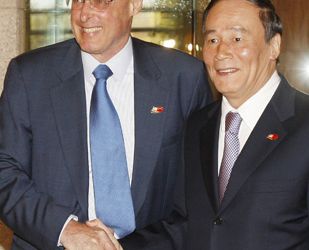US and China set for currency clash
US treasury secretary expected to press Beijing to allow yuan’s appreciation.

But China’s exporters, suffering as their main markets such as the US and Europe cut back on spending, have lobbied the government to slow or reverse the yuan’s rise against the dollar to make their goods more competitive abroad.
The US is struggling with recession and China has seen a sharp slowdown in growth in recent months.
How well they keep one of the world’s biggest trading relationships stable and productive could be of global importance.
Strong signal
The yuan plunged on Monday in government-controlled trading in its sharpest one-day fall since 2005, wiping almost one per cent of its value against the dollar.
Frank Gong, the chief Asia economist for JPMorgan Securities, said in a report to clients that the plunge could be a message to Washington to go easy on the issue.
“The signal China sent on Monday is: we also have our own political problems and issues in a slowing economic environment,” he said.
Gong added the Beijing may have been sending a warning to Barack Obama, the US president-elect, who has yet to say whether he will continue the talks, that talking will be more effective than confrontation.
On Wednesday, Chinese state media made the warning more explicit.
“US urged not to harp on currency issue at talks,” said a headline in the China Daily.
Relationship-building exercise
The Strategic Economic Dialogue, launched in 2006, covers a broad agenda, including co-operation in energy conservation and environmental protection, and it is meant as a relationship-building exercise rather than a forum for negotiation.
But David McCormick, the US treasury undersecretary, told reporters this week that US officials at the dialogue would urge China to continue allowing the yuan to rise.
In a speech on Tuesday, Paulson said it was important for China to stick to its currency reforms and rely more on domestic demand to drive growth.
“As I have said in the past, continued reform of China’s exchange-rate policies is an integral part of this broader reform process,” he said.
Beijing broke a direct link between its yuan and the dollar in July 2005 and has let its currency rise by about 20 per cent since then.
That has hurt Chinese exporters, which are seeing their goods get more expensive in foreign markets just as global demand slows.